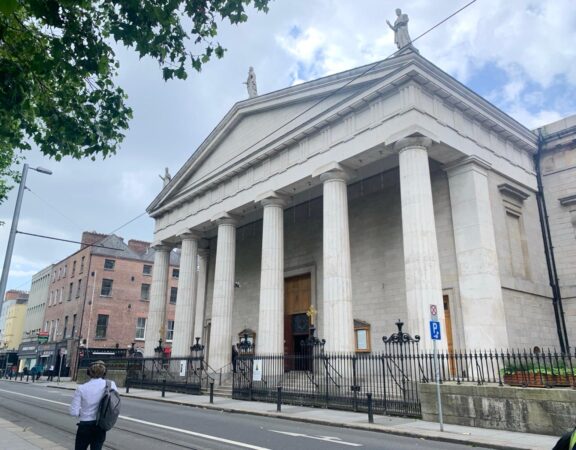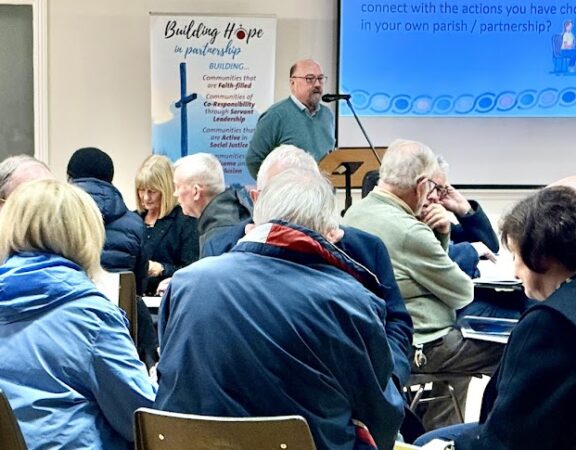‘Communicating the Family: A privileged Place of Encounter with the Gift of Love’
The 49th World Communications Day will be celebrated next Sunday 17 May 2015 – the Solemnity of the Ascension of the Lord and the Sunday before Pentecost. The World Day for Social Communications was the only worldwide celebration called for by the Second Vatican Council (Inter Mirifica, 1963). The theme that Pope Francis has chosen for World Communications Day this year is: ‘Communicating the Family: A Privileged Place of Encounter with the Gift of Love’.
Welcoming this year’s World Communications Day message, Archbishop Eamon Martin said: “Pope Francis expresses a clear and fundamental message for the benefit of the whole human family and it relates to our earliest shared experience and common bond. The Holy Father tells us that “it is in the context of the family that we first learn how to communicate.” His message is offered to us as we prepare for the Synod of the Family which will take place in the Vatican, during October, guided by the theme The Vocation and Mission of the Family in the Church and Contemporary World. I urge everyone with a love of family to reflect upon this year’s challenging message for World Communications Day.”
Some of the key points from this year’s World Communications Day message from Pope Francis are as follows:
“In the family, we learn to embrace and support one another, to discern the meaning of facial expressions and moments of silence, to laugh and cry together with people who did not choose one other yet are so important to each other.
More than anywhere else, the family is where we daily experience our own limits and those of others, the problems great and small entailed in living peacefully with others. A perfect family does not exist. We should not be fearful of imperfections, weakness or even conflict, but rather learn how to deal with them constructively. The family, where we keep loving one another despite our limits and sins, thus becomes a school of forgiveness.
When it comes to the challenges of communication, families who have children with one or more disabilities have much to teach us. A motor, sensory or mental limitation can be a reason for closing in on ourselves, but it can also become, thanks to the love of parents, siblings, and friends, an incentive to openness, sharing and ready communication with all. It can also help schools, parishes and associations to become more welcoming and inclusive of everyone.
In situations apparently dominated by hatred and violence, where families are separated by stone walls or the no less impenetrable walls of prejudice and resentment, where there seem to be good reasons for saying ‘enough is enough’, it is only by blessing rather than cursing, by visiting rather than repelling, and by accepting rather than fighting, that we can break the spiral of evil, show that goodness is always possible, and educate our children to fellowship.
Today the modern media, which are an essential part of life for young people in particular, can be both a help and a hindrance to communication in and between families. The media can be a hindrance if they become a way to avoid listening to others, to evade physical contact, to fill up every moment of silence and rest, so that we forget that ‘silence is an integral element of communication; in its absence, words rich in content cannot exist’. The media can help communication when they enable people to share their stories, to stay in contact with distant friends, to thank others or to seek their forgiveness, and to open the door to new encounters.
The great challenge facing us today is to learn once again how to talk to one another, not simply how to generate and consume information.
The family is a community which provides help, which celebrates life and is fruitful. Once we realise this, we will once more be able to see how the family continues to be a rich human resource, as opposed to a problem or an institution in crisis. At times the media can tend to present the family as a kind of abstract model which has to be accepted or rejected, defended or attacked, rather than as a living reality. Or else a grounds for ideological clashes rather than as a setting where we can all learn what it means to communicate in a love received and returned. Relating our experiences means realising that our lives are bound together as a single reality, that our voices are many, and that each is unique.
Families should be seen as a resource rather than as a problem for society. Families at their best actively communicate by their witness the beauty and the richness of the relationship between man and woman, and between parents and children. We are not fighting to defend the past. Rather, with patience and trust, we are working to build a better future for the world in which we live.”
ENDS
Previous messages for the World Day for Social Communications have addressed:
2006: The Media: A Network for Communication, Communion and Cooperation
2007: Children and the Media: a Challenge for Education
2008: The Media: At the Crossroads between Self-Promotion and Service. Searching for the Truth in order to Share it with Others
2009: New Technologies, New Relationships. Promoting a Culture of Respect, Dialogue and Friendship
2010: The priest and pastoral ministry in a digital world: new media at the service of the Word
2011: Truth, proclamation and authenticity of life in the digital age
2012: Silence and Word: Path of Evangelisation
2013: Social Networks: portals of truth and faith; new spaces for evangelisation
2014: Communication at the Service of an Authentic Culture of Encounter







